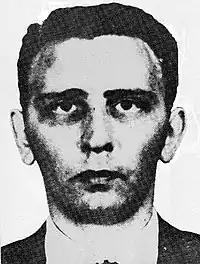Guenther Podola
Guenther Fritz Erwin Podola (8 February 1929 – 5 November 1959, alias Mike Colato) was a German-born petty thief, and the last man to be hanged in the UK for killing a police officer.[1] His trial was notable and controversial because of his defence of amnesia and the use of expert witnesses to determine whether his illness was real.[2]
Guenther Fritz Erwin Podola | |
|---|---|
 Podola in 1959 | |
| Born | 8 February 1929 Berlin, Germany |
| Died | 5 November 1959 (aged 30) HMP Wandsworth, London, England |
| Cause of death | Execution by hanging |
| Other names | Mike Colato |
| Occupation | Thief |
| Criminal status | Executed |
| Conviction(s) | Capital murder |
| Criminal penalty | Death by hanging |
Life
Podola was born in Berlin, Germany. He was a fanatical member of the Hitler Youth movement.[3] Podola moved to Canada in August 1952. On 1 March 1957 he was sentenced to 10 days' imprisonment following a conviction for burglary in Montreal. Then on 26 March he was sentenced for another 11 counts of theft and burglary and imprisoned for 2 years. On 25 July 1958 Podola was released and deported back to West Germany.[3]
London
Podola moved to London on 21 May 1959. He assumed the alias of Mike Colato and pretended to be a gangster.[4] He broke into the house of an American model,[5] Verne Schiffmann in Roland Gardens,[6] and stole jewellery and furs worth £2,000.[1] He offered to return her possessions for £500,[4] but she notified the police who attempted to arrest Podola on 12 July 1959 in Kensington.[7] Podola shot one of the officers, Detective Sergeant Raymond Purdy, through the heart with a Radom 9mm semi-automatic pistol,[3] after he ran into a house at 105 Onslow Square.[6] He was later apprehended and Podola claimed he was beaten up by the police[8] and, as a result, lost his memory of events.[1] The police claimed that he was merely hit on the head when they broke down the door to his hotel room.[4]
Trial
The start of the trial was delayed for nine days while a jury heard evidence of whether Podola was medically fit to stand trial.[9] After 3+1⁄2 hours of deliberation, they decided he was.[3] A fresh jury was called to hear the trial itself which commenced on 18 July 1959.[3] When asked for his plea, he replied: "I do not remember the crime for which I stand accused ... I am unable to answer the charges."[9] He was defended by Frederick Lawton QC.[4] Neurologist Michael Ashby gave evidence as an expert medical witness at his trial, as did psychiatrist Archibald Leigh, who claimed Podola was feigning his illness.[8]
The jury took 38 minutes[9] to find Podola guilty of murder, and he was sentenced to death by the trial judge, Mr Justice Edmund Davies. He later confessed his guilt.[8] The Home Secretary, Rab Butler, under a little-known and little-used power, referred the case to the Court of Criminal Appeal, which upheld the conviction. The Attorney-General's refusal of leave to appeal to the House of Lords brought the case to a close in a fresh outburst of public controversy. Podola was hanged at Wandsworth Prison at 9:45 a.m. on 5 November 1959.[5] He was buried in the prison graveyard (grave 59).[3] His execution took place five years before the last execution of any criminal and six years before the suspension and later abolition of the death penalty.[3]
References
- Furneaux, Rupert (1960). "Crime Documentary Series 1 - Guenther Podola". Journal of Mental Science. 107 (447): 348.
- The Modern Law Review, Vol. 24, No. 3, May 1961, pp. 413-415
- "Gunter Podola". Archived from the original on 10 February 2008. Retrieved 19 January 2008.
{{cite web}}: CS1 maint: bot: original URL status unknown (link) - Google books - Villain's Paradise: A History of Britain's Underworld, p452
- Infamous Murders: Murdered on Duty - Crime And Investigation Network Archived 30 December 2007 at the Wayback Machine
- Long, David (2012). Murders of London : in the steps of the capitals killers. London: Random House. pp. 126–129. ISBN 9781847946720.
- Crimetime
- Royal College of Physicians
- "Foreign News: Verdict on Podola". Time. 5 October 1959.